Whether you’re a professional mechanic or just like to dabble with your own cars, a good pair of mechanics gloves can help you quite a bit when it comes to keeping your hands safe. However, how can you determine whether a pair of mechanics gloves are doing the necessary work to keep you safe on the job?
The most obvious way to protect your hands from injuries while on the job is to get yourself a quality pair of mechanics gloves. You will need to consider the materials they are made of, their overall durability, the amount of nimbleness they provide, and more.
Let’s get into how you can determine whether or not a pair of mechanics gloves is a worthwhile investment for you or not. You’ll want to pay attention to many things, but we’ll try to cover what’s most important. There are so many options for work gloves on the market, and you’ll want to be sure that the ones you’re investing in are worth it.
In this guide, we’ll break down the different parameters you will want to look at when evaluating mechanic’s gloves. We’re also going to want to address the obvious – how mechanics’ gloves can help prevent workplace injuries from occurring.

How Prominent Are Hand Injuries in the Workplace?
Out of all the workplace injuries in the United States every year, hand and finger injuries are by far the most prominent. According to a study published in the Journal of Occupational and Environmental Medicine, over one million Americans a year are treated for finger and hand injuries that occur on the job.
This makes sense, as your hands are what you use to interact with and utilize power tools and other potentially dangerous equipment. It’s particularly obvious how carpenters, plumbers, construction workers, electricians, mechanics, and tradespeople would regularly sustain hand and finger injuries.
There are many different kinds of hand injuries that people encounter when on the job. These include crushing accidents, lacerations, and broken or fractured bones. Lacerations comprised about 64% of all hand and finger injuries, and many were caused by using nails, saws, and other basic tools.
It seems reasonable to assume that many of these injuries could have been avoided using a thick pair of mechanics gloves. However, not everyone wants to inhibit their ability to work by wearing gloves. We’ll get into this more later.

Mechanics Gloves Materials and What Matters
Synthetic Leather – Durability Meets Dexterity
Why it matters: Synthetic leather offers excellent abrasion resistance, grip, and flexibility without the stiffness of real leather. It resists shrinking, dries faster, and provides a snug fit — ideal for automotive or mechanical tasks.
Best for: General mechanics work, tool handling, construction.
Example: Mechanix Wear FastFit Gloves use synthetic leather palms for a strong yet comfortable grip.
Nitrile – Chemical and Puncture Resistance
Why it matters: Nitrile is a synthetic rubber that’s resistant to oils, grease, and chemicals, making it perfect for automotive or industrial environments. Nitrile-coated or full-nitrile gloves offer superior protection against fluids and sharp objects.
Best for: Mechanics, chemical handling, sanitation.
Example: Neotril 8 Mil Heavy Duty Nitrile Gloves provide outstanding puncture resistance and grip.
Spandex and Nylon – Comfort and Flexibility
Why it matters: Spandex and nylon backs keep gloves lightweight, breathable, and stretchable, preventing hand fatigue. They allow airflow, so your hands stay cool even during long shifts.
Best for: Light-duty work, assembly, and precision tasks.
Example: HyFlex Ansell 11-840 Gloves combine nylon-spandex with nitrile coating for ergonomic comfort.
Foam or Neoprene Padding – Shock and Vibration Control
Why it matters: Gloves with padded palms or knuckles absorb vibration and protect against light impacts. This reduces strain when using power tools or working with machinery.
Best for: Automotive repairs, construction, tool-intensive work.
Example: JUMPHIGH Safety Work Gloves include foam knuckles and padded palms for extra cushioning.
Coatings and Textures – Grip and Protection Layer
Why it matters: Many gloves feature textured coatings (like nitrile foam or diamond patterns) to improve grip in oily or wet conditions. This helps prevent tool slips — one of the main causes of hand injuries.
Best for: Oil & gas work, mechanical maintenance, fabrication.
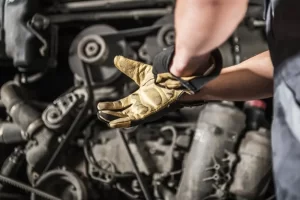
Staying Safe on the Job
One important thing to remember is that no matter how strong any pair of mechanic’s gloves are, you can’t protect your hands from all the possible injuries you might sustain on the job. There’s a reason that your industrial-strength bandsaw is cutting through carbon steel sheeting like it’s nothing.
Even with the most expensive pair of gloves, you can get your hands on, you aren’t going to be stopping a hook-toothed blade with them any time soon. It’s important to remember that you still need to act like you’re not wearing any hand protection at all when on the job.
This means fully understanding the tools that you’re using. Ask questions of your supervisors and coworkers so that you’re always confident before entering a job you might not fully understand. Never get involved in a task that makes you nervous unless you’re 100% positive that you know how to do it.
Diving headfirst into something is a great way to learn how to swim – not necessarily a great way to learn how to operate power tools.
Top 5 Mechanics Gloves Comparison Table
Brand & Model |
Material / Build |
Key Features |
Protection Level |
Grip & Dexterity |
Comfort & Breathability |
Best For |
Price |
|---|---|---|---|---|---|---|---|
Mechanix Wear FastFit Work Gloves |
Synthetic leather palm, CoolPlus mesh back |
Touchscreen compatible, vibration damping, abrasion-resistant |
⭐⭐⭐⭐ |
⭐⭐⭐⭐ |
⭐⭐⭐⭐⭐ |
Automotive, construction, maintenance |
|
Neotril 8 Mil Heavy Duty Nitrile Gloves |
8 mil thick nitrile, diamond texture |
Latex & powder-free, chemical-resistant, disposable |
⭐⭐⭐⭐⭐ |
⭐⭐⭐⭐ |
⭐⭐⭐ |
Mechanics, chemical handling, sanitation |
|
HyFlex Ansell 11-840 Gloves |
Nylon-spandex shell with foam nitrile coating |
Ergonomic design, abrasion-resistant, all-day comfort |
⭐⭐⭐⭐ |
⭐⭐⭐⭐ |
⭐⭐⭐⭐⭐ |
Automotive, fabrication, assembly |
|
HANDLANDY Work Gloves |
Synthetic leather palm, spandex back |
Touchscreen fingertips, padded palm, knuckle protection |
⭐⭐⭐ |
⭐⭐⭐⭐ |
⭐⭐⭐⭐ |
Yard work, light mechanic tasks, DIY |
|
JUMPHIGH Safety Work Gloves |
Synthetic + pigskin leather reinforcements |
Touchscreen compatible, padded knuckles, adjustable cuff |
⭐⭐⭐⭐ |
⭐⭐⭐⭐ |
⭐⭐⭐⭐ |
Maintenance, logistics, general labor |
Summary
-
Best Overall: Mechanix Wear FastFit — unbeatable combo of fit, protection, and durability.
-
Best Heavy-Duty Disposable: Neotril 8 Mil Nitrile Gloves — maximum chemical and puncture resistance.
-
Best Ergonomic Fit: HyFlex Ansell 11-840 — excellent grip and comfort for precision work.
-
Best Budget Pick: HANDLANDY Work Gloves — ideal for light-duty tasks and yard work.
-
Best All-Purpose Value: JUMPHIGH Safety Gloves — great balance of comfort and durability for daily use.
The Best Mechanics Gloves Reviews
1. Neotril 8 Mil Heavy Duty Disposable Nitrile Gloves
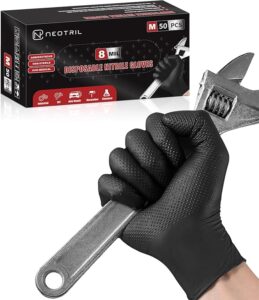
When it comes to serious hand protection, the Neotril 8 Mil Heavy Duty Disposable Nitrile Gloves stand out as a top choice for mechanics, technicians, and industrial workers. Designed for strength, grip, and comfort, these gloves deliver performance that goes beyond typical disposable options.
Key Features
-
8 Mil Thick Protection: Twice as thick as standard nitrile gloves, providing superior puncture and tear resistance.
-
Diamond Texture Grip: Raised pattern ensures a secure, non-slip grip — even when handling oily tools or wet surfaces.
-
Latex & Powder-Free: Safe for sensitive skin and reduces contamination risks in clean workspaces.
-
Touchscreen Compatible: No need to remove gloves when using your phone or diagnostic tablets.
-
Multi-Purpose Use: Great for automotive repair, sanitation, food handling, and industrial applications.
Pros
-
Exceptional durability and puncture resistance for heavy-duty tasks.
-
Excellent grip even in greasy environments.
-
Comfortable fit with flexible dexterity for precise work.
-
Allergy-safe—no latex, no powder, no irritation.
-
Versatile use across multiple industries and settings.
Cons
-
Slightly stiffer feel compared to thinner nitrile gloves.
-
Higher cost per pair, though justified by quality and protection.
-
Limited color options (typically only black or blue).
2. HANDLANDY Work Gloves for Men & Women
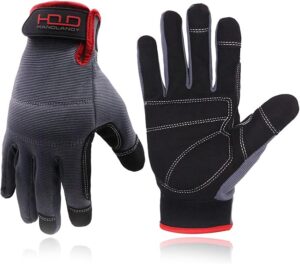
The HANDLANDY Work Gloves are built for comfort, flexibility, and light-duty protection — ideal for mechanics, gardeners, and DIY enthusiasts who need reliable hand safety without sacrificing dexterity. These gloves balance protection and mobility, making them a popular pick for everyday tasks.
Key Features
-
Flexible & Breathable Spandex Back: Keeps hands cool and comfortable during long hours of work.
-
Touch Screen Fingertips: Allows phone or tablet use without removing gloves — perfect for multitasking.
-
Knuckle Protection: Foam-padded knuckles help absorb light impacts and reduce bruising.
-
Padded Palm: Reduces vibration and hand fatigue when using tools.
-
Lightweight Design: Great for yard work, repairs, and general maintenance.
Pros
-
Excellent breathability for hot work environments.
-
Touchscreen-compatible — no interruptions when handling devices.
-
Good comfort and fit thanks to stretchable spandex and adjustable wrist.
-
Shock-absorbing palm padding enhances control and reduces strain.
-
Affordable and versatile for everyday use.
Cons
-
Not designed for heavy-duty industrial work or high-impact tasks.
-
Limited cut resistance compared to thicker mechanic gloves.
-
Padding may wear out faster under rough conditions.
3. JUMPHIGH Safety Work Gloves
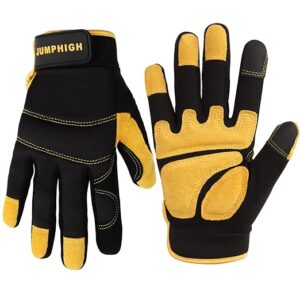
The JUMPHIGH Safety Work Gloves are designed for professionals who need a balance of durability, comfort, and protection. With a rugged synthetic leather palm, breathable back, and touchscreen fingertips, these gloves are built to handle everything from auto repair to home projects.
Key Features
-
Durable Synthetic Leather Palm: Offers excellent grip, toughness, and resistance to shrinking or cracking.
-
Breathable Spandex Back: Keeps hands cool while maintaining flexibility and dexterity.
-
Touchscreen Fingertips: Lets you use your phone or tablet without removing the gloves.
-
Reinforced Palm & Knuckles: Pigskin leather padding and foam cushioning protect against light impacts and wear.
-
Adjustable Cuff: Hook-and-loop closure ensures a secure, customized fit for all-day use.
Pros
-
Strong grip and durability from reinforced palm design.
-
Comfortable and breathable even during long work sessions.
-
Touchscreen compatibility adds convenience on the job.
-
Good knuckle and palm protection for general-purpose work.
-
Versatile for mechanics, construction, warehousing, and DIY tasks.
Cons
-
Not ideal for heavy-duty industrial or high-heat environments.
-
Padding may compress over time with daily use.
-
Limited waterproofing, so not suitable for wet conditions.
4. Mechanix Wear FastFit Work Gloves
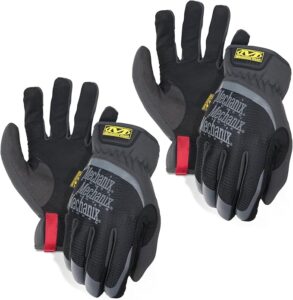
The Mechanix Wear FastFit Work Gloves are engineered for professionals who demand precision, durability, and comfort. Built with a synthetic leather palm, abrasion-resistant materials, and touchscreen compatibility, these gloves deliver excellent hand protection without sacrificing dexterity.
Key Features
-
Precision Fit & Dexterity: A single-seam fingertip and 2-piece palm design allow natural hand movement and improved control.
-
Touchscreen Compatible: Use your devices seamlessly while staying protected — no glove removal needed.
-
Durable Ripstop Design: Reinforced back and Lock Ring thumb saddle protect against wear, tears, and heavy use.
-
Vibration Damping: Neoprene knuckles and vented palm padding absorb shock and reduce hand fatigue.
-
Enhanced Comfort: CoolPlus mesh and breathable materials prevent heat buildup during long hours of work.
Pros
-
Excellent fit and flexibility for precision tasks.
-
Highly durable synthetic leather and reinforced stitching.
-
Touchscreen-friendly — perfect for modern work environments.
-
Effective vibration and impact damping.
-
Breathable and moisture-wicking, ideal for extended use.
Cons
-
Not fully cut-resistant, so not suited for sharp metal work.
-
Limited insulation — not ideal for cold-weather jobs.
-
May run slightly snug, so sizing up could improve comfort.
5. HyFlex Ansell 11-840 Ergonomic Abrasion
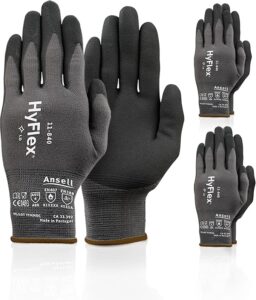
The HyFlex Ansell 11-840 Ergonomic Industrial Gloves are a trusted choice for professionals who need superior grip, abrasion resistance, and long-lasting comfort. Designed for the automotive, fabrication, and industrial sectors, these gloves deliver protection without compromising dexterity or breathability.
Key Features
-
Foam Nitrile Coating: Offers twice the grip and up to 20% higher abrasion resistance than standard coated gloves.
-
Ergonomic Design (ERGOFORM Technology): Reduces hand fatigue and enhances comfort during long shifts.
-
Durable Nylon-Spandex Construction: Provides flexibility, a snug fit, and long wear life.
-
Versatile Application: Ideal for automotive work, metal fabrication, oil and gas, warehousing, and general industrial use.
-
Available in Multiple Sizes: From size 5 to 12, ensuring a precise fit for every worker.
Pros
-
Exceptional abrasion resistance for demanding tasks.
-
Excellent grip in dry or slightly oily conditions.
-
Lightweight and breathable, reducing sweat buildup.
-
Ergonomic fit minimizes strain and hand fatigue.
-
High versatility across multiple industries.
Cons
-
Not designed for chemical or high-heat protection.
-
May lose grip in heavy oil environments.
-
Limited impact resistance — best for precision rather than heavy-duty work.
What to Look for When Choosing Mechanics Gloves
-
Protection: Match the glove’s material to the job hazard — cuts, chemicals, or vibration.
-
Fit: A snug fit ensures better control and safety.
-
Breathability: Look for spandex or mesh backs to reduce sweating.
-
Grip: Nitrile or textured coatings prevent tool slips.
-
Durability: Reinforced palms and stitching extend glove life.
Frequently Asked Questions
1. What are the best materials for mechanics gloves?
Answer:
The best mechanics gloves use a combination of synthetic leather, nitrile coating, and spandex or nylon backing.
-
Synthetic leather provides durability and a strong grip without stiffening like real leather.
-
Nitrile coating resists oils, grease, and chemicals — perfect for automotive or industrial work.
-
Spandex or nylon ensures flexibility, breathability, and comfort during long use.
Some premium models, like the Mechanix Wear FastFit or HyFlex Ansell 11-840, combine these materials for the ideal balance of protection and dexterity.
2. How do mechanics gloves help prevent hand injuries?
Answer:
Mechanics gloves protect against common workplace hazards such as cuts, abrasions, burns, and impact injuries.
-
Reinforced palms and knuckles shield against scrapes and minor impacts.
-
Textured or coated grips prevent tool slips that can cause pinching or crushing.
-
Vibration-damping padding reduces fatigue from power tool use.
By combining grip, protection, and comfort, quality gloves like Neotril 8 Mil Nitrile or JUMPHIGH Safety Gloves help reduce accidents and long-term strain.
3. How do I choose the right size and fit for mechanics gloves?
Answer:
To get the best fit, measure around your knuckles (excluding your thumb) and compare the measurement with the manufacturer’s sizing chart. Gloves that are too tight can restrict movement and cause fatigue, while loose gloves reduce control and safety.
Most brands like Mechanix Wear and HANDLANDY offer multiple sizes (S–XXL) and adjustable cuffs for a secure, custom fit. Always ensure your gloves feel snug but flexible — allowing you to grip tools comfortably without slipping.
Finding the Right Pair of Mechanics Gloves for You
We hope this guide proved helpful to you when deciding how to find a good pair of mechanics gloves. It can be tough to navigate all the information available online these days, so we hope that this straightforward information we provided cleared things up on what you should look for in your next pair of work gloves.
Related Resources:
